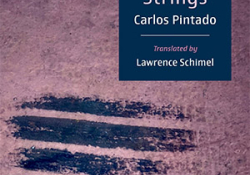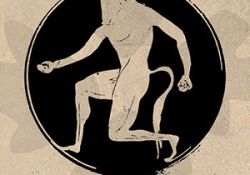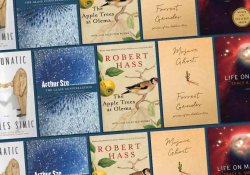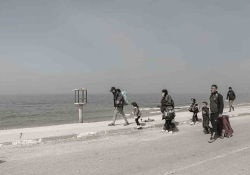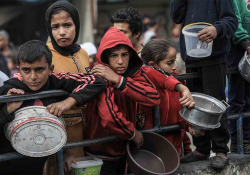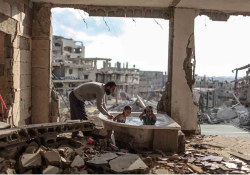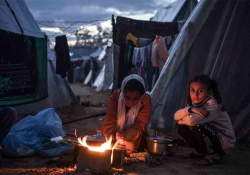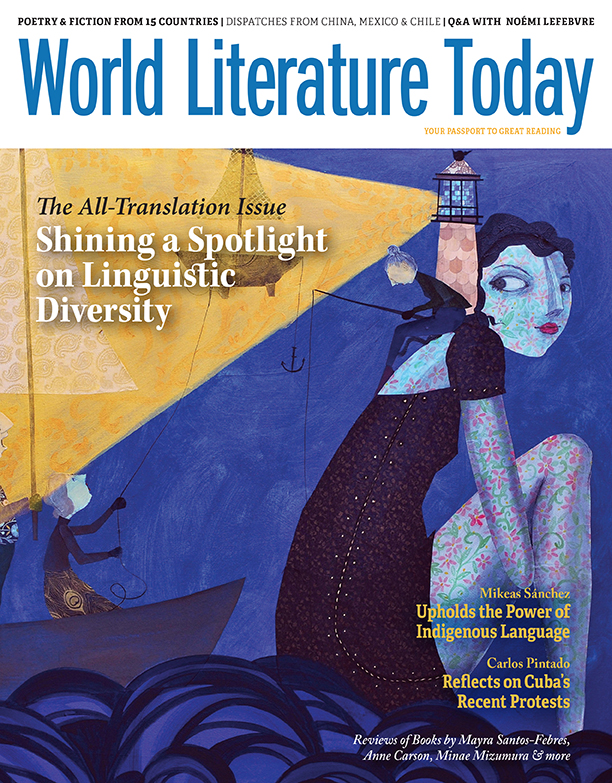The Cubanmaid’s Tale

Life and politics are the same on an empty plate, in a body plagued by a pandemic. But in Cuba, people are rising up and challenging the regime. Here, Cuban American poet Carlos Pintado traces the horror and the hope.
Everything becomes muddled with the creaking of empty plates at night, with the distant and deafening sound of an atrophied soul, of the body that no longer knows where in the city to hide or to avoid a virus, with the uncertainty that you no longer matter, not to a country, nor to a government, to a neighbor, and all this merges, as in those inevitable chemical reactions, with the recovery of a memory that had been stolen from us, the memory that perhaps is the only act of rebellion that man has against time.
It all begins when the hand that holds the fork begins to scratch its own accumulated nonconformity: life and politics are the same on an empty plate, in a body plagued by a pandemic. The Cuban government has done everything possible to allow its hospitals to collapse, by denying foreign aid, and continues to lie, over and over, repeating the same stale monologue of a bizarre soap-opera heroine, but absent the credibility of earlier times. As Anne Sexton wrote, “The end of the affair is always death.”
The Cuban government has placed the country before an empty plate.
The Cuban government has placed the country before an empty plate. But an empty plate is more than a plate; it’s a mirror that doesn’t lie.
Between one action or another lies a government that’s done the only thing it’s ever known how to do: corner its people, restrict their human rights, reduce them to useless clay figurines, place them before a slow-motion firing squad. A government that’s created and sustained a circus for sixty-two years, and now that circus is engulfed in fire, ablaze with the pyrotechnics of pain and failure. The whole of Cuba is a circus in flames, a theme park that hasn’t been allowed to evolve. A government that’s unleashed violence against those who think differently, those who dissent, those who don’t follow an official dictate. A government that’s refused to loosen its grip on power, that won’t yield, that won’t listen to anyone who thinks differently; a government in mourning, ossified as if it were a sacred and indispensable fossil, that has somehow made us accomplices of something or someone; a government that looks ridiculous now, naked, filled with rusty old plots and ploys, which believes that when someone dares to ask for freedoms or changes, when they demand the most basic necessities of life, they are conspiring against it, putting it under siege, rendering it a naked Eve.
Between one action or another lies a government that’s done the only thing it’s ever known how to do: place them before a slow-motion firing squad.
It all begins when memory awakens like a thousand-year-old pachyderm. The Cuban people are, have been, like a huge elephant that’s waited too long to change its pace, break its chain, give the long-awaited cry of freedom.
One of the first (and worst) achievements of the Cuban dictatorship, if it can be called an achievement, is having created the belief that we’re alone in the world, that no one will listen to us, that family isn’t family and friends aren’t friends. The entire island floating in a cosmos of aloneness and delirium. Another dubious achievement is having convinced us that the blame always lies elsewhere, in other geographies or governments: if a building collapses in Havana or someone commits suicide in one of its provinces, if a family doesn’t have a lobster or fruit to put on the table, it’s the fault of the US embargo or the Cuban exiles in Miami or a baobab in Africa.
When the Cuban people took to the streets on July 11, unannounced, with a dazzling and unprecedented spontaneity, that false idea of aloneness or isolation was shattered. If before, Cubans resorted to whispering to communicate political or human disagreements and to avoid problems with the regime, that whisper has now become a shout, and that shout has found an echo and other shouts, and the hands that before improvised signals in the air are now a hulking invertebrate mass, shaking, whipping up neighbors, waking up those who are asleep, helping up those who fall, screwing their courage to the sticking place, calling their brothers brother and the executioner executioner.
Those who took to the streets to shout have already won half of the war; those who took a step outside left the sulfur circle of fear a little further behind, courageously winning their portion of glory. No one who doesn’t know what he wants can shout well. Perhaps that’s why we’ve seen a united people walk, run, come together, shake hands, recognize one another, reconcile, shout with euphoria that they’re no longer afraid, demand what they deserve, and all this in the face of the government’s military response: bits and pieces of a dark amorphous mass that suddenly appears, like J. K. Rowling’s Dementors, to attack and kill, sometimes, emitting strange howls that seem unhuman. In the hundreds of videos of the police unleashing on the peaceful Cuban people, the only thing one hears is the people’s wailing, taking a stand or asking for help or understanding; some have even asked for clemency while the Dementors of repression on call never cease to look like demonic figures scourging, beating, killing, dragging without uttering a word or anything approaching it, as if they didn’t possess language, because they are programmed to not articulate words or string together sentences, to obey blindly and perversely the invisible orders of a supreme demon: appear, bludgeon, kill.
Two days after July 11, as I watched a video in which several policemen climbed up to the roof of a building to pull down and beat a young man who was merely asking for a free Cuba, a friend who is an Irish filmmaker asked me what kind of horror I saw.
I wanted to explain to him that horror doesn’t look like anything, that horror only looks like horror, the same way a fruit only looks like a fruit or a beach only looks like a beach; but, instead of answering him, I returned to the fifty-nine-second video: fifty-nine seconds in which the viewer can see perfectly the boy pulled down by the first policeman, as ten other policemen climb up a rickety ladder, electrified with hate, and how during every second of the video there’s a kick to the boy’s body, a blow with a club, with a brick, arms holding him down, choking him, other arms pummeling his face, his stomach, his life. Twenty police arms and twenty police legs unleashing with force and without mercy on a defenseless body that did nothing more than ask for a free country and a better life, an episode that matches in violence and agony the one suffered by George Floyd in the United States and which managed to breathe renewed spirit into Black Lives Matter, because the ten Cuban policemen are, without a doubt, another Derek Chauvin multiplied by ten on the defenseless body of that young man.
Horror is absolute, unlike anything else; horror and despair are often confused. Together they run a marathon that few want to join. In Cuba, horror has flowed like a silent magma for sixty-two years; first with the Castros and now with the current ruler, Díaz-Canel, that uncharismatic imitation toy no one elected democratically and who had the audacity to go on national television to exhort violence at the moment he should have appealed to dialogue. Any other puppet that used such inflammatory speech from a presidential podium would have suffered instant dismissal.
I try to explain to my Irish friend that almost nothing of what we’re seeing is new, that repression and killings have been constant all these years: our daily bread. I clarify that the only thing new is that the people have taken to the streets and that we now have cell phones and apps and social media to upload videos so that someone in Australia or Dubai or the Amazon can witness our cries for freedom and change, and that death, just as in “The Dead,” that marvelous story by James Joyce, has always been our underlying theme.
As I write these words, writers and artists like Javier L. Mora, Amaurys Pacheco, and Hamlet Lavastida are still imprisoned or disappeared, as are Katherine Bisquet Rodríguez and Luis Manuel Otero Alcántara, and many others. I won’t expand on the list of names because it would be endless. I will only say that the number of disappeared grows each day and that the government has already begun summary trials, without due process, without defense attorneys, as it did years ago with my father and my uncle and hundreds of thousands of other prisoners of conscience.

It makes me a little sad, of course, that after so many years we’ve not been able to rid ourselves of a dictatorship like the one we still have. Why is it that Cuba looks more and more like Margaret Atwood’s Gilead? Is Cuba our Handmaid’s Tale, our Orwellian Animal Farm, our Caribbean Gulag?
Freedom, we know, is not an ideograph, but in Cuba we still have not achieved it. In every city in the world there are protests, people peacefully dissenting, as is their right. To protest peacefully in Cuba, however, is to walk on a minefield or step on a cobra.
If I were a spoken-word poet, I’d stop writing this essay and improvise a poem something like this:
The embargo is not responsible for the dead, the dictatorship is.
The embargo is not responsible for the summary trials, the dictatorship is.
The embargo does not forbid eating beef or catching a lobster, the dictatorship does.
The embargo does not forbid freedom of speech, movement, or thought, the dictatorship does.
The embargo does not imprison political prisoners, the dictatorship does.
The embargo does not force people to die for their homeland, the dictatorship does.
The embargo does not force you to kill for your country, the dictatorship does.
The embargo does not spy on your phone conversations, the dictatorship does.
The embargo does not forbid writers like Virgilio Piñera or Reinaldo Arenas, the dictatorship does.
The embargo does not tell you that to die for your country is to live, the dictatorship does.
Islands have always had the strange beauty of tombs in bloom.
Everything becomes muddled with the creaking of empty plates at night, with the distant and deafening sound of the atrophied soul. In the 1990s, when I was a university student, a few of my friends and I talked about disguising a political protest as a hunger strike. It seemed less dangerous to us, or so we thought. We’d clandestinely read Milan Kundera, Mario Vargas Llosa, George Orwell, Guillermo Cabrera Infante, and María Elena Cruz Varela, and we wrapped the book covers with paper to hide the authors. We’d begun to dream of the possibility of a more just, habitable, and caring country. Islands have always had the strange beauty of tombs in bloom. Today I see so many young people taking to the streets, asking for the same thing I’d have wanted to ask for twenty years ago. The Cuban poet Reina María Rodríguez asks us not to neglect islands. “Islands,” says Reina, “are apparent worlds / cut off in the sea / moving past in the solitude of rootless lands” (trans. Kristin Dykstra & Nancy Gates Madsen).
“No man is an island,” wrote John Donne, but it occurs to me that while one man is not an island, perhaps many men and women might be.
South Beach, Miami
Translation from the Spanish


